AVAC is thrilled to see the launch of injectable cabotegravir for PrEP (injectable CAB) in Zambia—the first program outside of the US to do so. And the Desmond Tutu Health Foundation in South Africa recently announced “the first jab” of injectable CAB administered in its FASTPrEP study.
What is PrEP Access Right Now and What’s Next in 2024?
Webinars to Look Out for in February!
2024 is off and running and a slew of webinars are on the calendar. This selection of topics is both broad and deep, providing updates on the pipeline from cure to vaccines, insights on critical advocacy, a conversation with the new director of NIAID, and opportunities for you to engage. Scroll down for what’s coming up and recordings of webinars from December and January that you may have missed.
Coming up!

AVAC in Conversation with NIAID’s Jeanne Marrazzo
February 27, 11:30 am – 12:00 pm EST
Join AVAC in conversation with the new Director of NIAID, Jeanne Marrazzo. Register here.
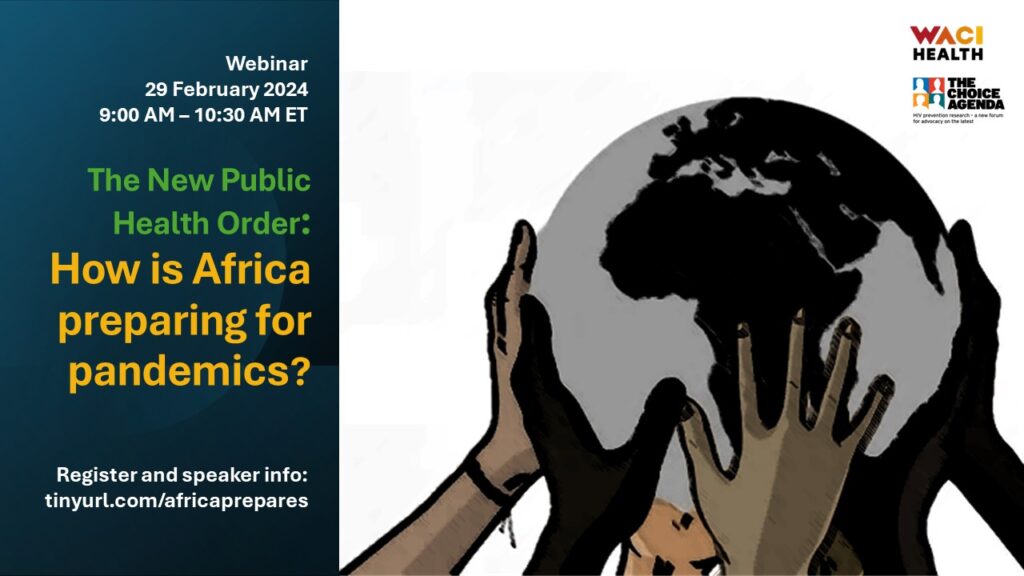
The New Public Health Order: How is Africa preparing for pandemics?
February 29, 9:00-10:30 am EST
WACI Health and The Choice Agenda invite you to join us for a webinar introducing key initiatives of the Africa CDC and the African Union. It will illuminate roles for civil society and community engagement. Register here.
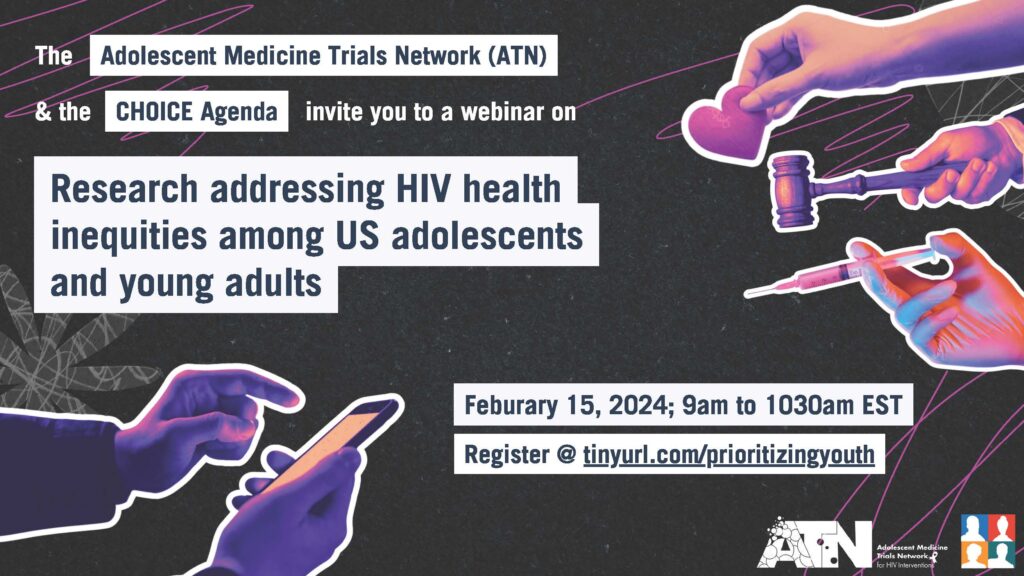
Join The Choice Agenda for an overview of the newest cycle of the Adolescent Medicine Trials Network! This webinar includes highlights of: ATN 165: Linking Youth to PrEP Services, which tests an innovative mobile delivery and mHealth intervention for PrEP adherence and persistence among sexual minority men; ATN 167: Legal, Economic, and Affirming Peer Support (LEAP) for transgender and gender diverse youth; and how the network prioritizes and amplifies the voices of youth directly impacted by the ATN’s pivotal research. Register here.
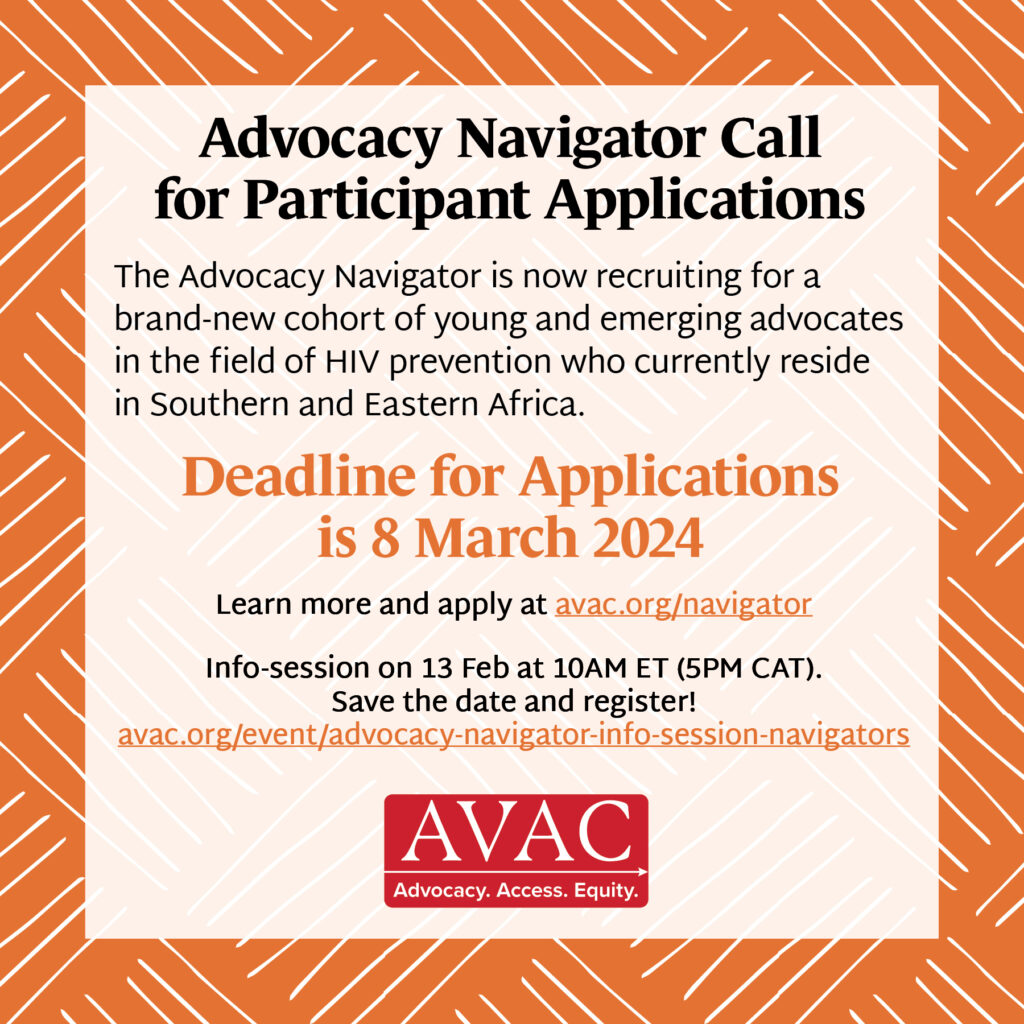
Advocacy Navigator Program Info Session
February 13, 10:00-11:00 am EST
This webinar is intended for anyone interested in applying to participate in AVAC’s Advocacy Navigator program. The session will provide an overview of the program, expectations, eligibility, and application process, followed by Q&A with the AVAC team.
In case you missed it!
Reporting the African Science Story: Decoding scientific research to support public health in Africa
Through the Media Science Café Program, AVAC partners with health media associations in Kenya, Tanzania, Uganda, Zambia and Zimbabwe to bring journalists together with researchers, implementers, civil society, policy makers, regulators and policy makers to build relationships that will foster accurate reporting of HIV, COVID and other science or health stories in those countries. Learn about the model! Recording, slides and resources.
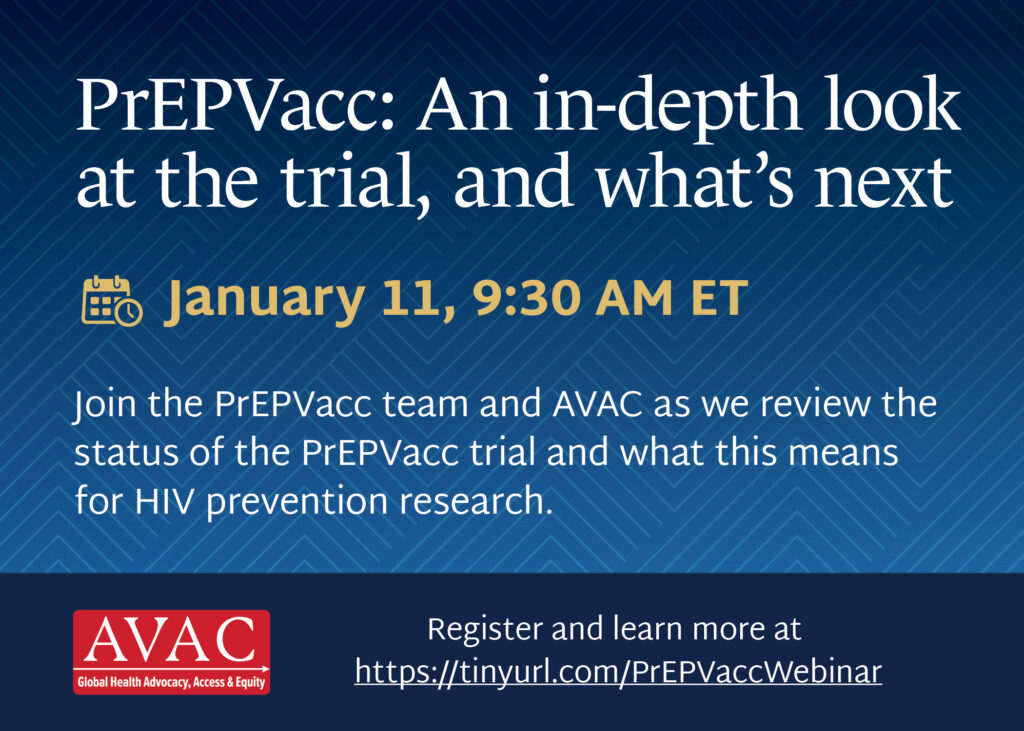
PrEPVacc: An in-depth look at the trial, and what’s next
This webinar reviewed key aspects of PrEPVacc, including its innovative study design, implementation, integrated social science, and data analysis plans. An engaging conversation about what we’ve learned from PrEPVacc, what we can still learn, and what this may mean for the HIV prevention field. Recording, slides and resources.
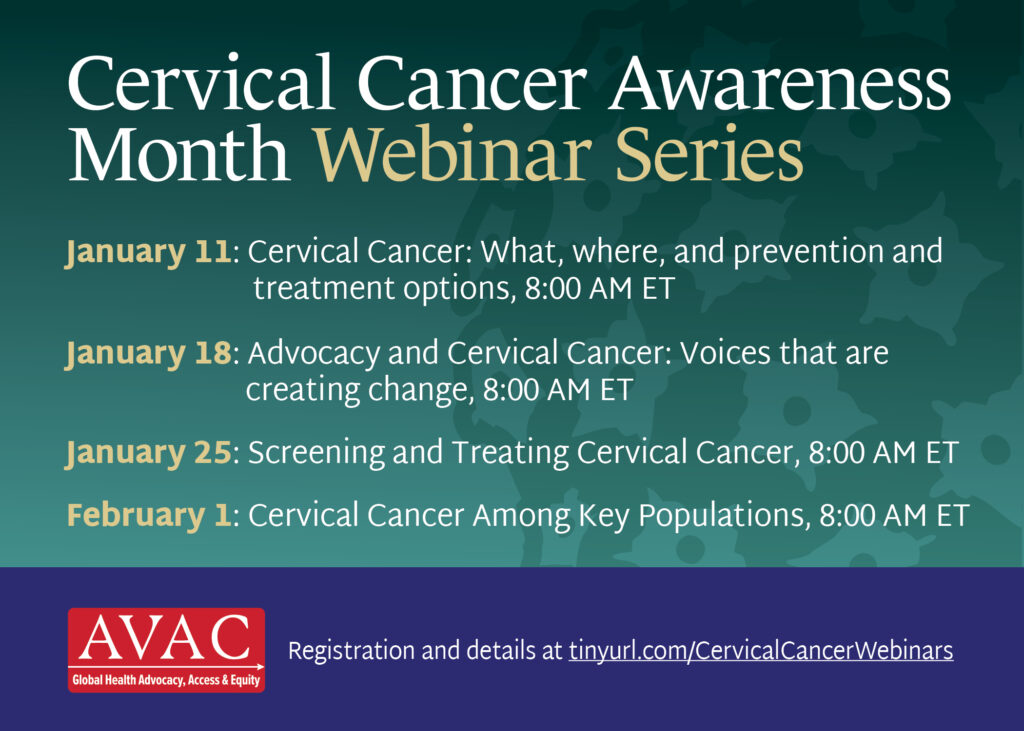
Cervical Cancer Awareness Month Webinar Series
Check out our 4-part webinar series on cervical cancer, which featured a deep dive on: what cervical cancer is, who is impacted, and prevention and treatment options; advocacy strategies to bring more attention to cervical cancer and its impact on communities; options for screening and treating cervical cancer along with ongoing research; and the impact of cervical cancer on key populations and those vulnerable to HIV infections. Recording, slides and resources.
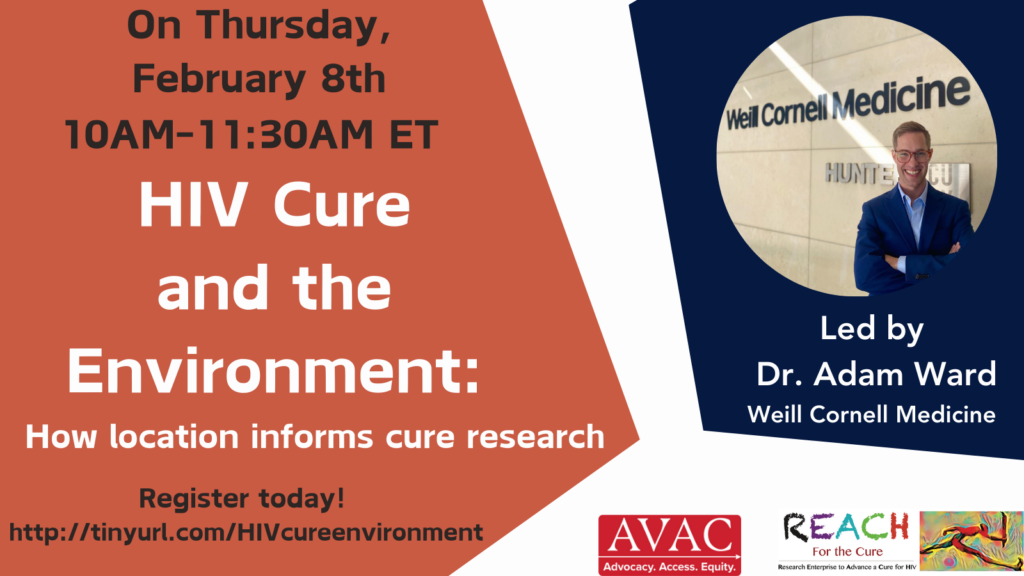
HIV Cure and the Environment: How location informs cure research
This webinar reviewed core concepts discussed in the previous webinar, Let’s Talk About HIV Cure Research: An Introduction to the science under investigation, and introduced how the environment may impact cure strategies. Recording, slides and resources.

Learn more about the townhall discussion on Black Gay Men and HIV in the US featuring influential figures in the Black Gay community, including Ace Robinson, Daniel D. Driffin, and Kenyon Farrow by checking out highlights on AVAC’s Twitter page and watch the full recording.
Thanks for checking out these conversations. We hope you will join us in these rich discussions and watch this space for future webinars!
Avac Event
The New Public Health Order: Strengthening Pandemic Preparedness in Africa
WACI Health, RANA and The Choice Agenda hosted a webinar on Thursday, February 29 called, “The New Public Health Order: Strengthening Pandemic Preparedness in Africa”
This webinar introduced key initiatives for the coming year from Africa CDC and the African Union and illuminate roles for civil society and community engagement. We heard from both Africa CDC representatives and key advocates on the development of these initiatives and what goals they intend to achieve.
Speakers:
- Jens Pedersen – Senior Advisor for Africa CDC
- Dr. Fifa Rahman – Pandemic Negotiations Consultant for Africa CDC
- Dr. Landry Tsague – Senior Advisor for Africa CDC
Moderator:
- Samantha Rick – AVAC
Recording / Resources / Transcript
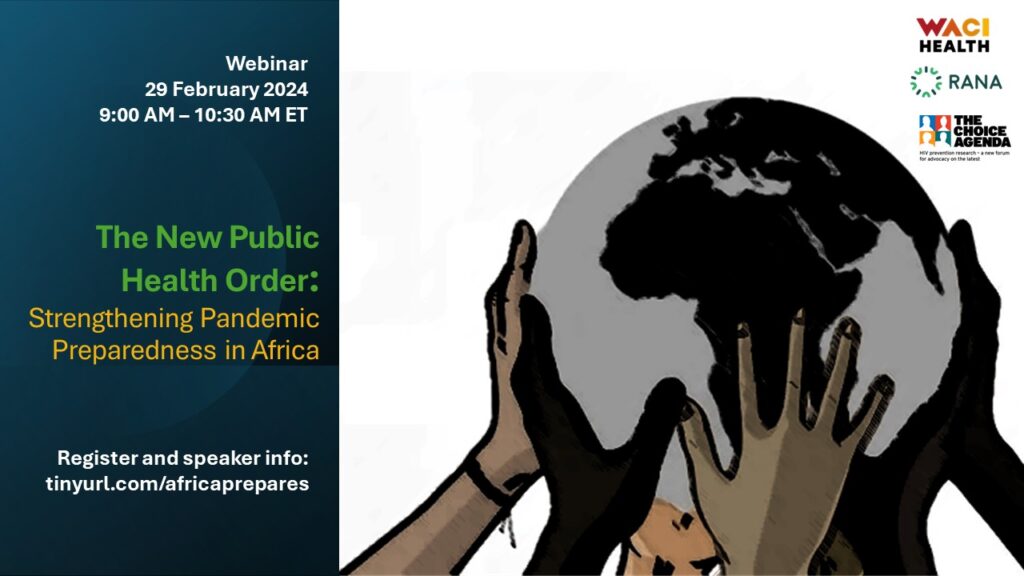
Avac Event
HIV Cure and the Environment: How location informs cure research
AVAC and REACH for the Cure hosted a webinar to discuss how the environment may impact HIV cure strategies. During this webinar, both organizations explored how clades, co-infections, early treatment, and other factors can help inform existing approaches to HIV cure research. Dr. Adam Ward of Weill Cornell Medicine shared the latest data followed by an informal conversation.
New issue of POSITIVELY AWARE points the way towards a more equitable future
In many ways the world is entering an era of HIV prevention that many of us have spent the last 40 years fighting for— there now exists multiple options for preventing HIV that are safe, highly effective and easy to use. 2012 saw the introduction of the first ARV-based prevention option—daily oral PrEP. And over the past two years, WHO recommended, and several national regulatory agencies have approved, injectable ARVs for treatment and prevention, as well as the dapvirine vaginal ring.
While these advances are something to celebrate, this is far from the end of the road. Technological gains only go as far as people’s awareness of them, desire to use them, and access to them. And this is where we — as a public health community and as a planet of humans — struggle. Just like with the first ARV therapies in the mid 1990s, and the first PrEP pill for prevention a decade ago, we’re now four years into the FDA approval of the first long-acting ARV therapy and we are several years away from scaling up these long-acting medications and truly seeing the impact they can have on the lives of people (whether living with HIV or in need of PrEP), and on the HIV epidemic itself.
It takes the HIV response far too long to move these innovative inventions to the point where they become medical miracles, experienced by everyone who needs and wants them, regardless of race, ethnicity, national origin, religion, sexual orientation, gender identity, sex assigned at birth, pregnancy status or income.
There is a new special issue of the magazine POSITIVELY AWARE, co-edited by Kenyon Farrow, AVAC’s communications director, and Jim Pickett, AVAC’s senior advisor and lead of the Choice Agenda, that explores the impact of long-acting injectable treatment and PrEP. The articles, including a piece co-authored by John Meade, AVAC’s senior policy manager, and Danielle Campbell of PrEP in Black America and longtime AVAC partner, speak to the humans involved in downstream research, and what their experiences as patients, researchers, advocates and medical providers of long-acting treatment and PrEP teach us about how these products could be transformative. These stories make clear how far we still have to go to change our health systems so that they can meet their maximum potential.
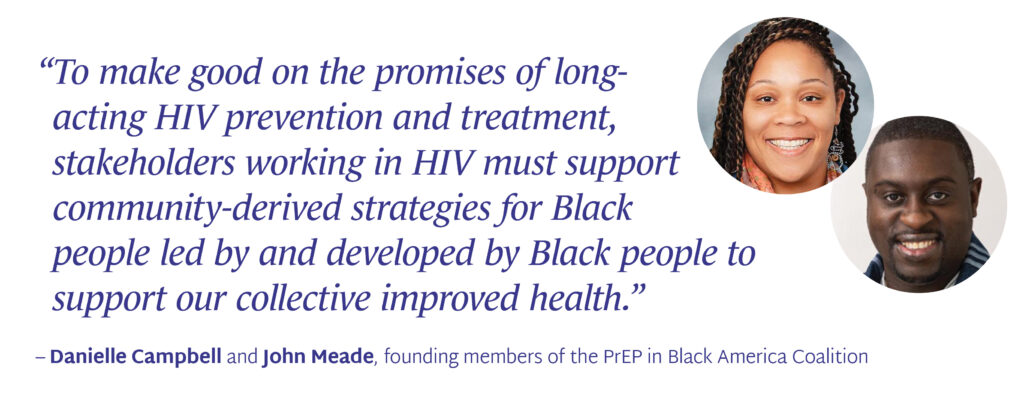
AVAC will continue our work to advocate for global equity in access to prevention and treatment in all their current and future forms. We celebrate this issue of POSITIVELY AWARE as one collection of voices helping to point the way towards a more equitable future.
Avac Event
AVAC in Conversation with NIAID’s Jeanne Marrazzo
The new director of National Institute of Allergy and Infectious Diseases (NIAID), Dr. Jeanne Marrazzo joined AVAC Executive Director in conversation.
Avac Event
The Adolescent Medicine Trials Network (ATN): Research addressing HIV health inequities among US adolescents and young adults
Join us for an overview of the newest cycle of the Adolescent Medicine Trials Network! This webinar will highlight ATN 165: Linking Youth to PrEP Services (LYPS) which tests an innovative mobile delivery and mHealth intervention to optimize PrEP adherence and persistence among sexual minority men, ATN 167: Legal, Economic, and Affirming Peer Support (LEAP) for transgender and gender diverse youth, and how the network prioritizes and amplifies the voices of youth directly impacted by the ATN’s pivotal research.
Speakers Include:
- Dr. Lisa Hightow-Weidman, ATN Principal Investigator, College of Nursing Florida State University
- Dr. Sybil Hosek, ATN Principal Investigator, University of Illinois-Chicago
- Dr. Sari Reisner, University of Michigan School of Public Health
- Dr. Kristi Gamarel, University of Michigan School of Public Health
- Dr. Kate Muessig, Florida State University
- Dr. Audrey Pettifor, University of North Carolina at Chapel Hill
- Zoe Njemanze, ATN Subject Matter Research Consultant
- Kendrick Forte, ATN Subject Matter Research Consultant
- Rodrigo Cabrera, ATN National Community Advisory Board
Avac Event
Cervical Cancer Awareness Month Webinar Series (Jan 11 to Feb 1)
Webinar 1: Cervical Cancer: What, where, and prevention and treatment options
Thursday January 11, 8:00AM/4:00PM EAT
This webinar provided an overview of cervical cancer including what cervical cancer is, who is impacted, and prevention and treatment options.
Speakers included: Helen Kelly, Shona Dala, and Maribel Almonte Pacheco, WHO and Michelle Chevalier, US Department of State—Bureau of Global Health Security & Diplomacy/PEPFAR
Recording / Helen Kelly Slides
Webinar 2: Advocacy and Cervical Cancer: Voices that are creating change
Thursday January 18, 8:00AM/4:00PM EAT
During this webinar, we heard from advocates on how they have used their voice to bring more attention to cervical cancer and its impact on communities.
Speakers include: Tamika Felder, Cervivor and Karen Nakawala, Teal Sisters Foundation Zambia
Recording / Tamika Felder Slides / Karen Nakawala Slides
Webinar 3: Screening and Treating Cervical Cancer
Thursday January 25, 8:00AM/4:00PM EAT
During this webinar, speakers discussed options for screening and treating cervical cancer along with ongoing research.
Speakers include: Fred Wyand, American Sexual Health Association/National Cervical Cancer Coalition and Bothwell Guzha, University of Zimbabwe
Recording / Fred Wyand Slides / Bothwell Guzha Slides
Webinar 4: Cervical Cancer Among Key Populations
Thursday February 1, 8:00AM/4:00PM EAT
This webinar explored how cervical cancer impacts key populations and those vulnerable to HIV infections.
Speakers include: Samiya Mahmoud, Association for the Prevention of Septic Abortion, Bangladesh (BAPSA) and Shona Dalal, Helen Kelly, WHO
New Year, New PrEPWatch Resources
In 2024 we look forward to continuing to provide advocates with tools to support our collective work to ensure access to PrEP in all its forms to all who can benefit from it.
PrEPWatch.org has grown significantly in the past year, reaching a growing number of implementers, policy makers and advocates with continually updated tools and information that are instrumental to delivering the growing range of HIV prevention options. Throughout 2023, visitors from every country in the world have used PrEPWatch.org, a one-stop online clearinghouse of data, guidelines, tracking tools and other resources to help the global community speed the delivery of every proven method of PrEP to everyone who needs it. Check out what’s new and updated on PrEPWatch.org!
New on PrEPWatch

Modelling the Scale-Up of Injectable CAB for PrEP
Our Biomedical Prevention Implementation Collaborative (BioPIC) teamed up with the HIV Modelling Consortium to produce this analysis of the potential impact of scaling up injectable cabotegravir (CAB) for PrEP, What can modelling tell us about the scale-up of CAB for PrEP? The findings can help implementers and policymakers understand what to expect and guide early policy decisions to maximize the impact of CAB for PrEP on the HIV epidemic.
Country Pages
PrEPWatch has added 35 new country pages where you can find the status of drug registration for PrEP products, data on PrEP initiations by product, country-level PEPFAR targets, and links to key policy documents and guidelines.
The Integrated Study Dashboard
Produced under the BioPIC project, the Integrated Study Dashboard tracks all currently known activities relating to implementation research, modelling, clinical research, and landscaping for new biomedical HIV PrEP options, including CAB for PrEP and the dapivirine vaginal ring (DVR), and has been recently expanded to include links to study results and study websites. The dashboard is updated in real time, and links to results will be added as they become available.
More Essential Resources on PrEPWatch.org

Tracking Country Planning for Product Introduction
The Country Planning for Product Introduction Matrix tracks key indicators for the introduction of injectable CAB and the DVR by country, including regulatory status, late-stage clinical trials and implementation research, procurement plans, and recent oral PrEP provision.
Training PrEP Champions
Among the most popular resources on PrEPWatch, the HIV Prevention Ambassador Training Package and Toolkit prepares potential and current PrEP users to be leaders – and “Ambassadors” – in the rollout of PrEP for HIV prevention in their communities. Developed as part of the MOSAIC project, it includes a training manual and resources for Ambassadors to use in peer outreach and community education.
Trends in PrEP Initiations
The Global PrEP Tracker provides quarterly updates on global trends in PrEP initiation by geography, delivery models, and more. The Global PrEP Tracker has become an indispensable resource for following the state of the field in delivering PrEP.
We hope these tools, created through strong partnerships and joint effort, support your work to accelerate the delivery of HIV prevention options. We are always interested in collaboration to ensure needed resources are developed and up to date. If you have information to share or resource needs, please let us know by reaching out to [email protected] and [email protected].
Avac Event
PrEPVacc: An in-depth look at the trial, and what’s next
During this webinar, the PrEPVacc team and AVAC reviewed the status of the PrEPVacc trial. PrEPVacc, a 3-in-1 trial testing two different vaccine candidates (plus placebo arm) and two daily oral PrEP regimens, recently discontinued vaccinations in the trial due to an independent data review board’s conclusion that the vaccines were having no effect in preventing HIV infection. On this call, we will review key aspects of PrEPVacc, including its innovative study design, implementation, integrated social science, and data analysis plans. Speakers engaged in conversation about what we’ve learned from PrEPVacc, what we can still learn, and what this may mean for the HIV prevention field.
- PrEPVacc Trial Design: Sheena McCormack, PrEPVacc Project Lead, MRC Clinical Trials Unit, University College London, UK
- Trial Implementation and Baseline Data: Eugene Ruzagira, PrEPVacc Trial Director, MRC/UVRI & LSHTM Uganda Research Unit
- Integrated Social Science: Rachel Kawuma, PrEPVacc Social Scientist, MRC/UVRI & LSHTM Uganda Research Unit
- Analysis Plan: Sheila Kansiime, PrEPVacc Statistician, MRC/UVRI & LSHTM Uganda Research Unit
Recording / Sheena McCormack Slides / Eugene Ruzagira Slides / Rachel Kawuma Slides / Sheila Kansiime Slides